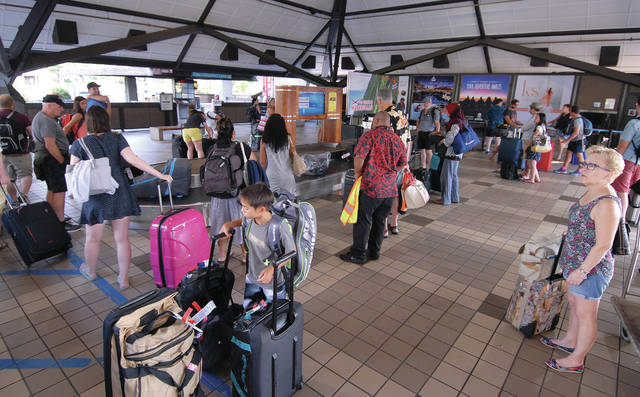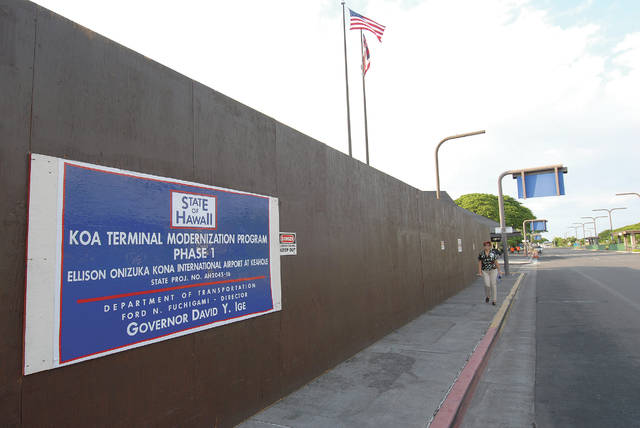KAILUA-KONA — Airline representatives and the state Department of Transportation continue to support legislation that would move the state’s 15 airports out from under the DOT and into their own governing body, the proposed Hawaii airport corporation.
The airport corporation, say its proponents, could be key in picking up the pace for improvements at the state’s airports, namely being able to spend money quickly for needed projects instead of having to go through the lengthy state procurement process.
“This all goes back to projects that have languished at our airports,” said Blaine Miyasoto, state government liaison for Hawaiian Airlines, who sat down with the West Hawaii Today editorial board this week.
As an example, Miyasoto pointed to the Daniel K. Inouye International Airport’s Mauka Concourse in Honolulu.
“That’s been the better part of nine years in the making and the ground has not even been broken on it yet,” he said.
And while he said he’s not putting the blame at the feet of any particular group, it’s the result of how the system currently operates in Hawaii.
The most recent version of the bill — considered this year by lawmakers and which ultimately died in conference — would have put the corporation’s power over airports, air navigation facilities, buildings and other facilities in the hands of a nine-member board of directors.
Members would be appointed by the governor, and the bill would have required there be one member representing each of the islands of Hawaii, Oahu, Maui and Kauai. A chief executive officer selected by the board of directors would lead the corporation. The corporation would take into its purview everything from landing, takeoff and service of aircraft to the comfort and convenience of travelers.
One particular issue with the current system, Miyasoto outlined, is the red tape that comes with any proposed project at an airport.
Funds for projects are closely tied to specific line items in a budget, meaning if a change is made on a project or something unexpected happens, it could result in another trip to the Legislature to get the ball rolling again. That means waiting for lawmakers to come back to session to eventually receive a yes or no decision.
The funds for airports, Miyasoto noted, currently and would continue to come from user fees. That is, an airport’s operating budget doesn’t come from the state, rather from airlines and other users who pay into it. A major goal of the authority would be for the board to be able to spend its funds as it sees fit without having to go back to the Legislature and wait for approval.
An airport authority, Miyasoto said, would be able to use those lump sum funds and manage programs from start to finish.
“That’s a huge part of this,” he said, “removing all that red tape.”
And the proposal has the full backing of the DOT, under whose umbrella airports currently fall.
“It really is just trying to get things more efficient,” said DOT spokesman Tim Sakahara.
Hawaii, he said, is one of three states in the country still using a state-operated airport system and the current system requires dozens of detailed steps to move a construction project to completion.
“And we want to be able to, quite frankly, eliminate a lot of the red tape,” he said.
The bill considered last year wasn’t without opposition.
In February, the Office of Hawaiian Affairs submitted testimony to the Senate Committee on Ways and Means opposing the bill because of concerns that it exempted the corporation from Chapter 171, which covers state laws related to public and ceded lands. Those laws require legislative approval for the sale or gift of state lands or to exchange public lands for private lands.
“The wholesale exemption of the corporation and its lands from Chapter 171 may threaten a range of Native Hawaiian interests in our limited public land base,” the OHA testimony said.
Miyasoto said the Hawaii airport corporation would comply with state constitutional law to include compliance with how ceded lands are currently protected and governed under the DOT. OHA did not respond to questions about whether its stance on the proposal changed in recent months.
Another concern was the impact on unionized employees and what would happen if they were moved over to the corporation. Miyasoto said the bill was drafted to move employees over in their covered position.
“So basically status quo,” he said.
Email Cameron Miculka at cmiculka@westhawaiitoday.com.









